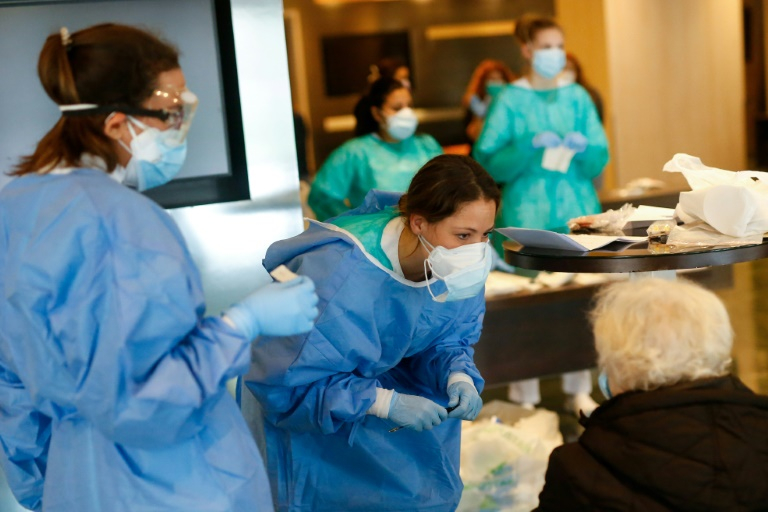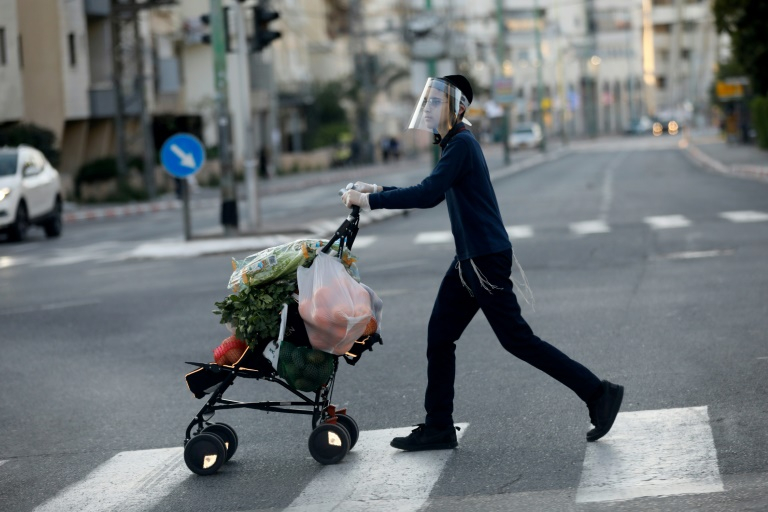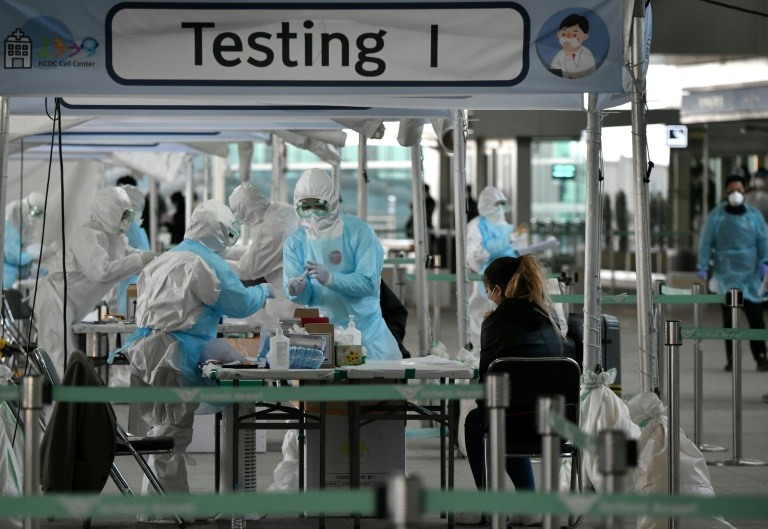
Healthcare workers attend to a COVID-19 patient at Hotel Melia Barcelona Sarria, which has been converted into a hospital, in Barcelona, Spain. /AFP
Healthcare workers attend to a COVID-19 patient at Hotel Melia Barcelona Sarria, which has been converted into a hospital, in Barcelona, Spain. /AFP
Confirmed coronavirus cases around the world topped one million on Thursday and the number of deaths soared past 50,000 as Europe reeled from the pandemic and the United States reported record numbers of people out of work.
The virus has claimed thousands more lives, with Spain and Britain seeing the highest number of daily fatalities yet. A record 950 people died from the coronavirus overnight, bringing Spain's death toll above 10,000 on Thursday. Britain also saw record 569 new deaths in the past 24 hours.
The coronavirus also continues to wreak havoc on the global economy, with the U.S. announcing a record 6.65 million workers filed for unemployment benefits last week and Spain reporting its biggest monthly increase in jobless claims ever.
U.S. unemployment hits new high, more states issue stay-at-home orders
The pandemic caused further disruption to the U.S. election calendar as the Democratic Party announced it was postponing its convention to choose a November opponent for President Donald Trump to August 17.
The decision came after the likely nominee, former vice president Joe Biden, said the convention, originally scheduled for July 13-16 in Milwaukee, Wisconsin, would probably need to be delayed.
Postponed elections perplex domestic politics
Also in the U.S., a virus-stricken cruise ship, the Zaandam, which has dozens of ill passengers and crew on board, was finally allowed to dock in Florida after being stranded at sea for weeks.

A Jewish youth wearing a protective plastic mask crosses a street after shopping in the Israeli city of Bnei Brak near Tel Aviv. /AFP
A Jewish youth wearing a protective plastic mask crosses a street after shopping in the Israeli city of Bnei Brak near Tel Aviv. /AFP
Europe reels
Europe has been at the center of the crisis for weeks, but there have been signs the epidemic could be approaching its peak.
In France, the coronavirus death surged to nearly 5,400 people on Thursday after the health ministry began including nursing home fatalities (884) in its data.
Italy registered 760 new deaths, with its total numbers continuing to fall.
The number of confirmed Spanish cases passed the 110,000 mark, although the rate of new infections continued a downward trend.
"The data show the curve has stabilized" and the epidemic has entered a "slowdown" phase, Spanish Health Minister Salvador Illa said.
In Britain, Prime Minister Boris Johnson vowed to "massively increase testing" as his health minister said the aim was 100,000 tests a day within weeks. Johnson, who contracted the virus, was speaking from self-isolation following criticism of his government's failure to provide widespread screening, particularly for frontline healthcare workers.
In Russia, President Vladimir Putin extended paid non-working days until the end of April as the number of confirmed cases jumped by more than a quarter on Thursday to 3,548, with 30 deaths. Most of the Russian population is on lockdown, with Moscow, in particular, facing tough isolation rules.
In such testing times, the healthcare systems of severely hit countries are being pushed to their breaking points as the countries scramble to take desperate measures. Per reports, supplies of ventilators and protective masks are running low and number of hospital beds is proving to be insufficient while retired medics are being called back to work to reinforce the front lines.
COVID-19 testing the limits of healthcare systems

Medical staff in protective gear take test samples for the COVID-19 from a foreign passenger at a virus testing booth outside Incheon international airport in Incheon, near Seoul, South Korea. /AFP
Medical staff in protective gear take test samples for the COVID-19 from a foreign passenger at a virus testing booth outside Incheon international airport in Incheon, near Seoul, South Korea. /AFP
U.S. sees record-breaking unemployment rate
The U.S., standing atop the pyramid in terms of the total numbers of infections, has more than 240,000 confirmed cases. On Thursday, the U.S. disaster response agency FEMA asked the American military for 100,000 body bags after White House modeling said there could be a range of 100,000 to 240,000 deaths in the coming months.
The surging number of confirmed cases brought surging number of hospitalizations and looming shortages in supplies, staff and sick beds. New York, New Orleans, and other hot spots in the U.S. are asking for help from the federal government, complaining they don't have enough ventilators and protective goggles to meet the urgent need.
When the U.S. is taking measures to contain the fast spread of the virus, trying to flatten the upward trending curve, fears of the worst global economic downturn since the Great Depression of the 1930s has also been raised. The U.S. Labor Department said the 6.65 million workers who filed for unemployment benefits last week was double the number the previous week, and the most ever recorded.
Economists warned U.S. job losses could surge to a previously unimaginable 10 to 20 million in April.
Financial ratings agency Fitch on Thursday predicted that the U.S. and Eurozone economies would contract this quarter by up to 30 percent on an annual basis, as struggling businesses slash investment and widespread unemployment dampens consumer spending.
World leaders have announced huge financial aid packages to deal with the crisis and the World Bank on Thursday approved a plan to roll out 160 billion U.S. dollars in emergency aid over 15 months.
COVID-19 Global Roundup: Global powers unleash trillions of dollars to stem coronavirus crisis
(With input from agencies)